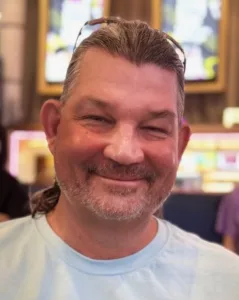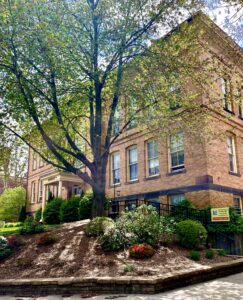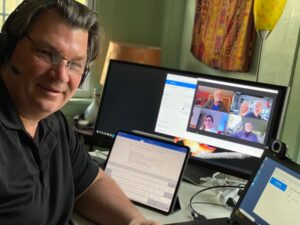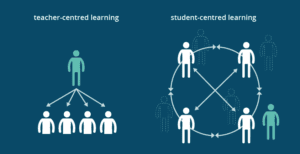ILI Spotlight

Meet Brian Long, one of the many dedicated teachers who work daily at ILI to advance our mission. This past winter, Brian returned to Thailand, visiting family and friends while working remotely with his ILI students. Read more about him, his passion for teaching and his commitment to intercultural understanding.
What brought you ILI?
I’ve known ILI for many years, first as a fellow host site of the School for International Training (SIT) TESOL Certificate. I believe ILI in Northampton was the first host site outside of Brattleboro, Vermont, the main campus of SIT, to deliver the SIT TESOL certificate. In 2000, I opened a SIT host site in Kyoto, Japan, and delivered TESOL courses there for three years. In 2003, I became Director of the SIT TESOL certificate, moving to Brattleboro as the SIT training community and other offerings grew. In 2008, I became a consultant trainer through 2014 when I took a brief hiatus with a job in Connecticut. The job didn’t last, but my wife and I loved it here so much, we stayed. In 2018, ILI invited me to train in SIT courses. Since then, I’ve also had the privilege of teaching in ILI’s free English classes for immigrants and refugees as well as some tutorials. In all, our long, ongoing relationship has lasted about 24 years.
What does ILI mean to you?

It’s an opportunity to work with an amazing group of caring and dedicated professionals who are deeply committed to what they do. I’ve spent the past 20 years working on international projects, many supported by the U.S. State Department and many through locally based private institutions. All share a belief of working in community towards making the lives of everyone better, and that’s what I see at ILI. My colleagues here really care about area residents and being a part of shared success. Many ILI educators and staff have extensive international experience and speak multiple languages. It reminds me of the expat communities that I’ve been part of around the world, and it is something, along with working with students from around the world, that feeds my soul.
Why are you passionate about language and education?
Language learning provides professional opportunities that might not otherwise exist. Learning another language is also learning the culture and history of that language. So much of who we are is embedded in our languages, our world views and being able to communicate with each other in each others’ languages increases the understanding and connections that we have. Finally, there is overwhelming evidence that being multilingual dramatically increases cognitive functions and can also delay or even eliminate dementia conditions like Alzheimer’s. So, learning languages is just plain good for us!
In what ways do you think ILI showed resilience during the pandemic?
Everyone at ILI worked hard at keeping the lights on, literally and figuratively. Knowing and believing in ILI, its mission and the importance of our community and the work being done, management worked tirelessly to secure the funding to make sure that programs could continue and that everyone’s learning was being served. In many ways, ILI has emerged stronger and more resilient as a result of the hard work and challenges of the past three years. An example of this is the increase in state funded “seats” for free English students in the coming year as a recognition of staff and teachers’ powerful work and student learning gains.
Has anything surprised you about the transition from in-person classes to online classes?

That it hasn’t been as difficult a transition as feared, and in some ways, I feel closer to my learners in the online environment. This is something other trainers have said in online discussion forums. There are more similarities than differences in teaching face-to-face and online. Both have their strengths and challenges, both provide rich learning experiences, and I very much appreciate the opportunity to be able to do both.
What was one of your most formative experiences with education, prior to becoming a part of this organization?
There’s not a single experience, but multiple instances, all having a common theme: being able to train teachers and teach learners at the same time. The training and the teaching create a feedback loop that helps me improve both skill sets. Things that I learn when training I apply to my teaching and vice versa. Also, learning in community with and from others. For example, in 2000, I was working with a co-trainer in Kyoto, Japan, delivering courses during school breaks and teaching at a university there. I learned an incredible amount. When I was working in Costa Rica, I was training in multiple courses with multiple trainers from various backgrounds and with a diversity of experience and knowledge. We were training experienced teachers, which meant I was learning from them as well. That same type of energy is here at ILI, where I get to train in the SIT TESOL Certificate and to teach English in the free English program. I really appreciate the experience and the ideas that I get from my colleagues and that I’m able to apply in my classes.
What does community mean to you?
Sharing ideas and resources and knowledge, listening and valuing the knowledge and life experiences of others, understanding diversity of beliefs based on individuals’ lived experiences, even those beliefs I don’t agree with.
Turning to teaching, what brought you to language education?
It was a happy accident. I’d never planned on being a teacher, but during undergraduate school, I spent a summer studying Spanish in Spain. That’s when I learned of the world of backpacking and traveling and living and working in different countries. After graduating, that was my goal, and teaching English became a means to that end. In the process I learned how much I actually loved it, and so I went back to school and got my masters in teaching, and the rest is history.
What does student-centered education mean to you?

It means the learners are the focus, that their existing knowledge and experience is an important part of who they are and influences how they are going to encounter and interpret the knowledge and skills of the classroom. It means creating space for students to share their knowledge and beliefs and to learn from each other. It also means working to help them unlearn certain knowledge or skills that are incorrect and possibly dangerous. For example, I do work for a labor union training fund, in the construction trades, and some of the workers have learned to dig ditches as part of their jobs in other contexts. However, some of the things that they have learned and practiced can be life-threatening. In one case, a trainer supervisor who visited a job site noticed a ditch that was not properly reinforced. He started filming it on his iPhone so that he could use it in class while also ordering everyone in the ditch at that time to get out. As the last worker was leaving the ditch, the walls collapsed. Luckily, everyone was safe. Not all situations are this critical, but it is an example of what it means to care about the learners, understand what some of their past learning experiences may have been, respecting them where they’re at and working with them in their learning.
How has teaching evolved since you became an educator?
I don’t know that it’s evolved as much as the industry has caught up to the teaching principles that we follow here at ILI. Textbooks are now aligned more with our philosophy and approach, and that has been very rewarding.
Do you feel like your students face unique challenges?
I think there is a commonality to the Expat and immigrant experience, regardless of the group, country or context. Different groups face different challenges, that we all find rewards, experience disappointments and joy. It’s all part of the human experience. What makes a difference is our community and how we can support each other, in good times and with challenges. That’s a part of what ILI is, a community sharing in the joys and challenges that life sends our way.
And what do you like to do when you aren’t working at ILI?
Going for long walks for my mental and physical health. Hippocrates said, “If you are in a bad mood, go for a walk. If you’re still in a bad mood, go for another walk.” I also like working in the garden with my wife, and taking my parents, who live with us, on beautiful drives to beautiful places.